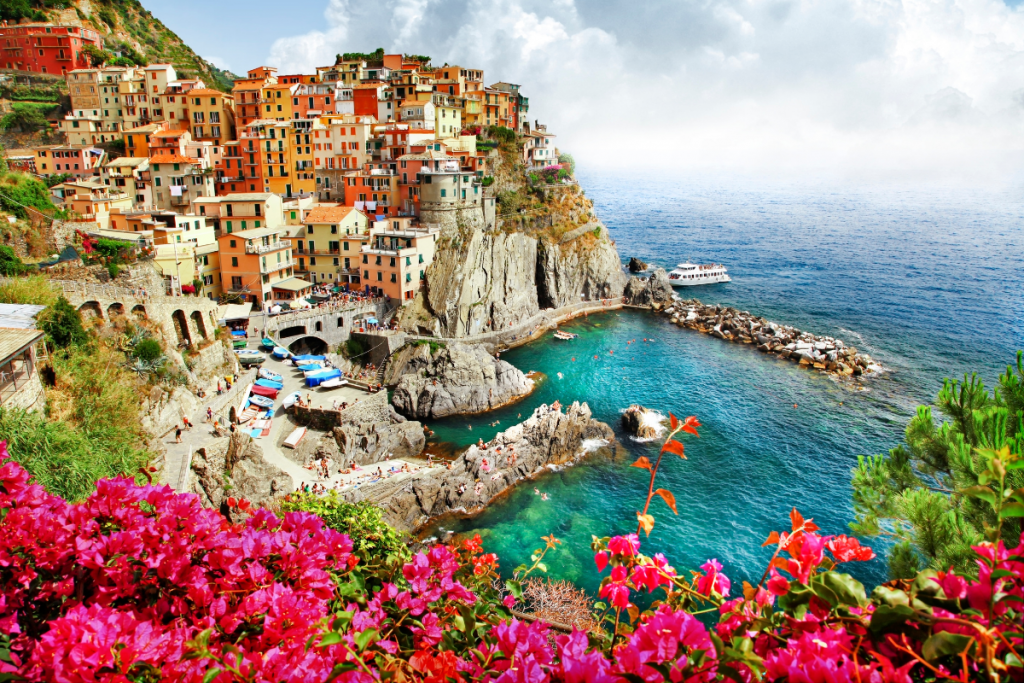Moving to Italy is a dream! It’s been a dream of mine as well for many years, and it did take some time to finally do this step. When I moved to Italy, I did it while not needing to find myself a job, as I’m self-employed. This took off my shoulders a lot of pressure, but it was still really challenging. So let’s see the first experience and tips on how to move to Italy?
If you’re planning on moving to Italy, here are some highlights you need to know and prepare for in order to make the process smoother.
Tips on Moving to Italy

If you move to Italy as a freelancer/remote worker
There are quite a few things you should remember to do before moving abroad. Now let’s see a few highlights! If you’re planning to settle down in Italy for a while or forever, and you’re a freelancer or remote worker, you’ll first need to get yourself health insurance! One of the top-rated, worldwide acknowledged remote health insurances is supplied by SafetyWing.
If you want to be insured while you’re living abroad, and you don’t speak the language and don’t want to deal with bureaucracy, it’s best to have remote health insurance! With SafetyWing you can manage your insurance online easily, and you can stay on top of everything that you might need if you need to use the insurance. It’s reliable and has an amazing coverage of remote health insurance for remote workers, freelancers, and companies.
Bureaucracy
When they say that the bureaucracy in Italy is really bad, believe them! I didn’t even imagine how deep they can take on the bureaucracy in this country until I moved here myself. I’ll give you a couple of examples, that will make you understand this.
First of all, I couldn’t buy a SIM card at some service providers without the so-called Codice Fiscale. Then, I had to sit in a b&b for a week, while the flat I wanted to rent was waiting there completely empty. Why? Because I didn’t have my Codice Fiscale. Without that code, nothing can be done here. Literally, nothing!
Also, you need to confirm your residence! Without the residenza, moving to Italy will be a pain! If you’re a freelancer or remote worker, you need proof of income for this. You either have to have an open Partita IVA (register for tax number as a self-employed), or show a proof of income. Also, you can’t get your tessera sanitaria – that literally means to enter the Italian health care without the above two things.
There are other issues you can face if you don’t have Codice Fiscale, Residenza, and Tessera Sanitaria! For example, you can’t open a bank account, you can’t buy essential things for your home like the internet, and you can’t get proper medical care in need. So these steps, though they take a lot of time, they are essential to get done if you’re moving to Italy!
How to move to Italy? – The Italian Post Office story
As the last experience, let’s see the Italian post office. I heard that that’s another nest of bureaucracy, but I was still hoping it’s not that bad. Now, I had a package to pick up that was part of one of my work projects, and I nearly couldn’t get it. Why?
In the Italian palazzos, there aren’t numbered flats, but names instead. So it’s not like you have an apartment number, you have your apartment’s name. As I just moved in, I didn’t even think, that I should change the name on the intercom, postbox, doorbell. I mean, what’s the point of that, right?
Well, the point is, that if the apartment isn’t wearing your name, and that’s not showing on the shipping address, you can’t take your parcel from the Italian post office. Basically, because on the address it was the previous tenant’s name, they didn’t want to give me the parcel, even though my name was on the label!
Conclusion on the Italian bureaucracy?
The Italian bureaucracy for outsiders especially seems ridiculous… It can feel like it makes no sense, and it’s understandable why. However, if you understand that it’s basically like a domino game, you can work with it easier. You must understand the steps, and follow them.
I have lived in 4 different countries before I moved to Italy. And never, nowhere I have ever faced so many complications. Just to take the UK as an example. I got my NI number, which is similar to the Codice Fiscale after 6 weeks of living there. I still was able to open my bank account, buy a SIM card, rent an apartment, and even get a work contract. Here you can’t do any of these without completing the essential steps!
A simple example: if you’re a freelancer and you need internet after moving to Italy
Codice Fiscale -> Rented appartment contract -> Partita IVA (or proof of income) -> Residenza -> Tessera Sanitaria -> Italian Bank account -> Internet!
You don’t need the Tessera Sanitaria to open a bank account but it’s needed to be done for any health care need. Also, you can’t do it without the basic Codice Fiscale that’s needed for everything, proof of income, or Partita IVA + the confirmed Residenza (residence).
Get your Codice Fiscale in Italy
As I have already mentioned, if you want to get anything done, the first step when you move to Italy must be to get your Codice Fiscale! Even though they require it for everything, you must know that by getting this code, things won’t go smoothly! It’s nearly impossible to get an appointment online. It’s even more difficult to get it over the phone. Don’t waste your time trying! If you want to get that code fast, you need to go to the Agenzia delle Entrate yourself, wait out your time and sort it out in person.
In Italy, if you want to get anything done, you have to do it in person!
I have spoken about this in my post about the Italian lifestyle. People in this country seem to prefer one on one contact more than tech and phones. So if you’re moving to Italy, be prepared that you’ll have to visit every institution personally, and wait in lines.
If you’re going to the Agenzia delle Entrate, make sure to arrive in the morning, before opening or you’ll spend hours waiting! If you can’t go in the morning, make sure to avoid going right before lunchtime, as you’ll waste a journey. Speaking of lunchtime, note for yourself that in this country everything is shutting down usually between 12-2 pm.
Note: When you’re moving to Italy can go to request your Codice Fiscale at the Agenzia delle Entrate just if you’re a European Union citizen. Otherwise, the process differs a little bit. See the next point!
For non Europeans citizens
For non-EU citizens, instead of getting a codice fiscale, you’ll have to go to complete different institutions. Basically, if you’re moving to Italy from outside the EU, you’ll get issued a temporary residence permit, which later you can also convert into a temporary permit. This is called permesso di soggiorno. Make sure to look up for all the documents you might need before you are heading to apply for it!
Finding a house to rent in Italy

First thing you need to know, that most houses and apartments are given by the owners to real estate agencies to handle. You can join Facebook groups to find apartments or rooms to rent as well, and that’s usually the easiest and cheapest way. In big cities like Rome, or Milan there are plenty of Facebook groups to join by typing in your search box appartamenti in affitto and the city you’re moving to in Italy.
Online househunting and agency fees
In Facebook groups, what I have seen so far is that you can mostly find just rooms to rent. If you’re looking for full flats or houses, you’ll most likely need to go on the renting websites. There are a couple of great websites to check out, such as the Idealista, the Casa.it, and Immobiliare.it.
Looking up for houses is an easy step. You’ll need to contact then the agency that’s handling the property. You can usually do it by messaging them on the platform, but again, if you want an actual answer, you better do call them! I contacted agencies in a message for about 13 properties. Do you want to guess how many email responses I’ve got? None!
Again, no tech, personal interaction!
When I started calling them one by one, I then managed to get through to all of them, and finally start scheduling the house tours.
There are three really important things you need to remember when you’re moving to Italy and looking for a house! Agencies will never ask you to pay anything in advance! If someone’s asking money from you before you’ve seen a house or signed a contract, that’s a scam! Be really careful with those who say that they live in another country, and they’d want to do the contract via Airbnb. I almost got tricked in this, as the “owner” said that he wouldn’t fly to Italy before I pay the deposit, as it’s a waste of money for him. Scam!
The second thing you need to prepare for when you’re moving to Italy is, that if you’re getting your house through an agency, you’ll have to pay an agency fee, which’s usually equivalent to one month’s rent.
The third is, that you won’t get your house contract signed and they won’t let you move in the house until you don’t have a valid Codice Fiscale! That is essential for the contract, and yes, I had to stay in a b&b for 5 days after finding my apartment, because I was waiting for the code.
Moving to Italy and accommodating will take time!
Prepare yourself that it will take days, or even weeks to find a place and to actually get to move in. If you’re one of those lucky ones who can get it all sorted quickly, that’s great. But knowing it from my real estate agent, as everything takes time in Italy, moving to a house in Italy will too! She said, that the fact that I managed to find my apartment, and sort everything out in one week, was actually a record time. Mostly what she can see, it take much longer!
Learn Italian BEFORE you move!
Really important, if not the most important step to make before moving to Italy! Learn some Italian, at least the basics! Even if you’re speaking the language, all the bureaucracy and paperwork take a ton of time but imagine if you’re not speaking Italian, and those people at the agencies and institutions don’t speak English! In that case, you can prepare for a disaster!
In big cities, most people speak some basic English even in institutions, but you can’t rely on that. You can’t know in advance if the person you’ll meet will speak English or not, so it’s for your own good to speak the basics, and have Google translate, or any other translater app ready on your phone!
Cost of living in Italy
Comparing it to the United States, or the United Kingdom, the cost of living in Italy is much lower! Giving an example of the rent. I live in a medium-sized town and I’m paying on my rent for a full apartment as much as I paid for one room in the UK! In England, I was living practically in a village, outside of London. To give you an example of numbers, I’m paying €500 for my flat. And it’s a really, really nice flat!
Booking.comIf you’re moving to Italy to a bigger city, the cost of living will obviously be higher. In Milan, a room is costing as much as my entire flat just an hour away! Plus there you have to pay for public transport and other expenses obviously.
However, usually speaking, in Italy, if you’re picking a smaller town or a village, you can live happily out of as low as €1000/month. If you’re planning on a big city, you will need a minimum of €1500-2000 for a comfy lifestyle. By this, I mean that you can afford some weekend getaways and dining out every week a couple of times. If you have a car, or you’re lifestyle requires more expensive stuff, obviously the numbers are going up too. This is just a basic cost, for basic needs and some entertainment included!
How to open a Partita IVA in Italy? How to work in Italy as self-employed?
When you ask how to move to Italy as a self-employed, there are a couple of things you need to keep in mind! First is, that you can’t live in Italy and be registered as self-employed in another country for more than 180 days.If you do so, you’ll have to start paying taxes not just where you’re registered, but in Italy too. And yes, you might be able to play this out, but if you get caught, you’ll pay for it. So, don’t risk! If you work in Italy and live here, get your partita IVA!
First step is to hire an accountant! In the UK, if you know some basic accounting, you can handle your own things, and you don’t need an accountant. However, if you work in Italy as a self-employed, you will need an accountant! I personally know many people who have their partita IVA, and they all have an accountant. Myself included!
With all the bureaucracy, different rules and tax reports, it’s impossible to do it on your own. So the first things you must do if you work in Italy as a freelancer is to find an accountant. Depending on your business, you can pay for this anywhere between EUR 400 to 1000 or more a year. The good thing in having an accountant is, that they sort everything out for you, and you do not have to worry.
Things to know if you open a Partita IVA in Italy
After your accountant opened your partita IVA, you can then send this to get your residenza, as I mentioned before. Also, there’s a type of self-employed in Italy that if you’re under the age of 35 and earning earily under EUR 30,000 you must know about! The lowest tax you can pay in Italy is 5%, and this is called Regime Forfettario. So if you start to work in Italy as a freelancer, and you’re eligible for this, you definitely must ask you accountant to register your IVA with Regime Forfettario!
If you have a partita IVA with the Regime Forfettario, and you pass the age of 35 let’s say, or you have your IVA open from 5 years, and you’re still not passing the yearly income that’s eligible for this tax form, you’ll then start paying 15% tax of your income. This is good to prepare for!
It’s not just the tax you’ll pay when you open a Partita IVA in Italy. As in every country, you’ll have to pay other types of taxes to the government, such as health, pension, and more. This is usually 20-22% of your yearly income. So prepare yourself for the tax paying in advance, that you’ll need to pay a total of around 27% of your yearly income! If you’re not eligible for the Regime Forfettario, you’ll get a tax paying code that can vary anywhere between 20-27% of your income! With that, the total tax you need to pay a year can go up to even 50%…
Is it worth moving to Italy?

The short answer is YES! Despite the bureaucracy, the paperwork, the headaches when you’re moving to Italy, it’s all worth it. Being able to look out the window every day, and see Italy outside is worth everything! Opening your fridge and taking out famous ham from Parma, or a great quality Parmigiano Reggiano makes it worth it!
To have the ability in the morning to go out for a cappuccino and a creamy brioche makes it worth it. Going on a 2-day weekend getaway, and being able to go to places like Cinque Terre, Florence, Milan, the Garda Lake, or Verona… That’s just so amazing! I mean, I can’t believe that I have to just hop on a train and I can be at any of my favorite Italian destinations in a couple of hours.
The beauty of this country, the amazing food, culture, life on its own makes it all worth moving to Italy. If you’re a freelancer or owning your own business, Italy is a great place to live! If you come here trying to find random work, however, won’t be as great!
When someone is asking me if it’s worth moving to Italy and working in Italy, my answer is this! It is worth it if you’re your own boss! Otherwise, just if you speak the language and have a degree and have a possibility to find a very well-paying job. Othewise, you might not like living in Italy as much as you could!
For me, it’s been the best decision I have ever made, and I’m grateful for every second I get to spend living in Italy!
Pin me: How to move to Italy? Things you need to prepare for!


Disclaimer: This post containes affiliate links. This means, if you purchase through these links, I’m going to earn a small comission. This isn’t affecting you in any ways though!
